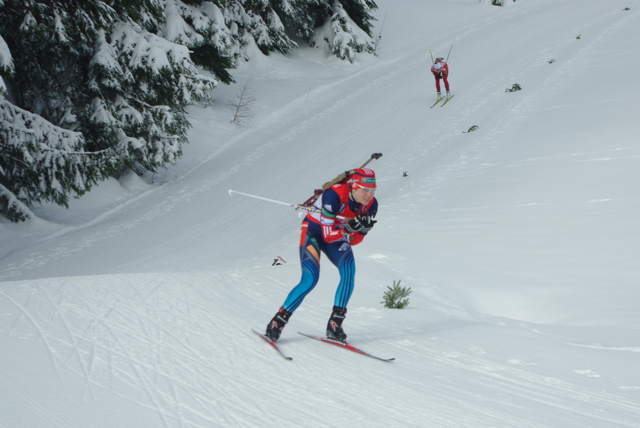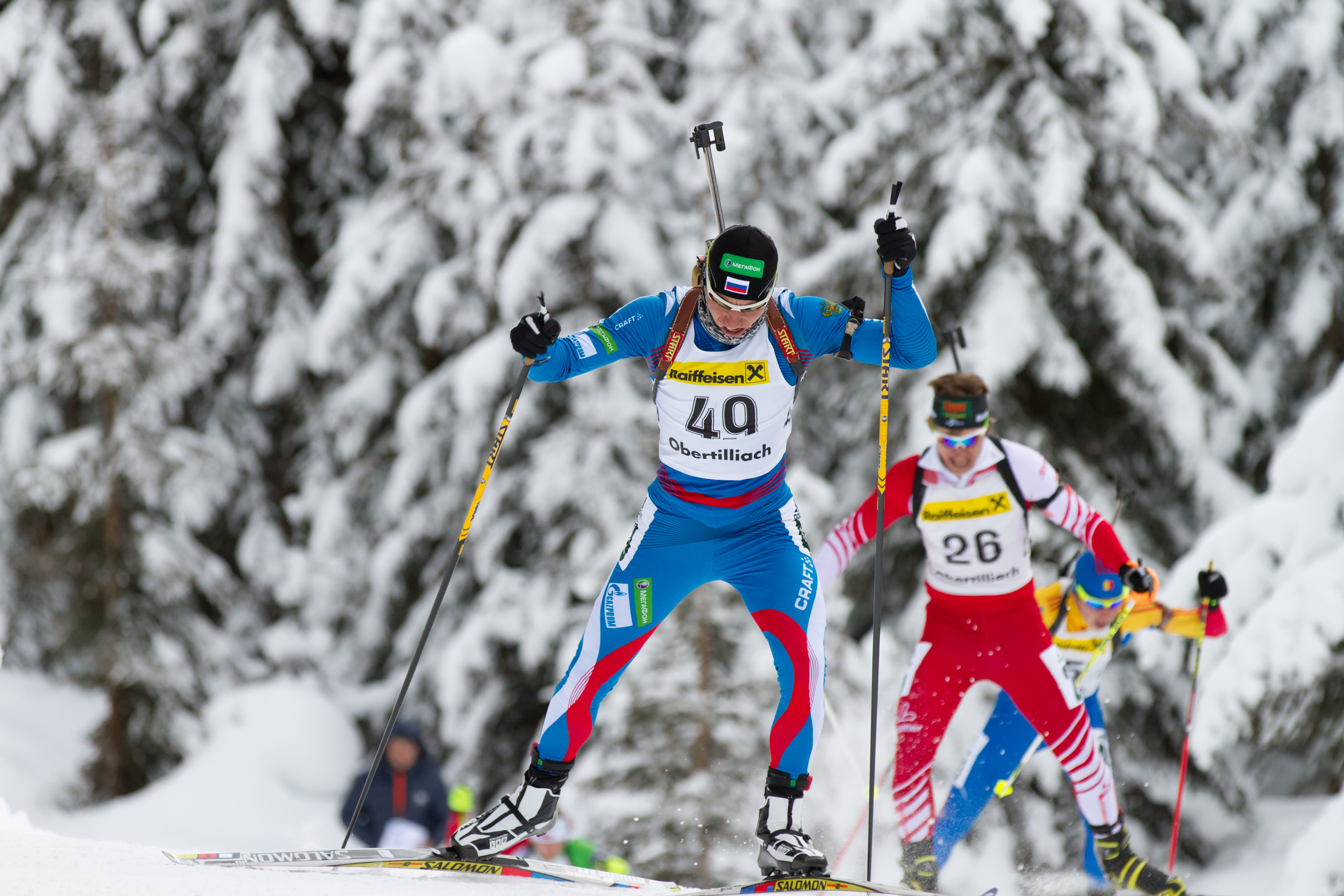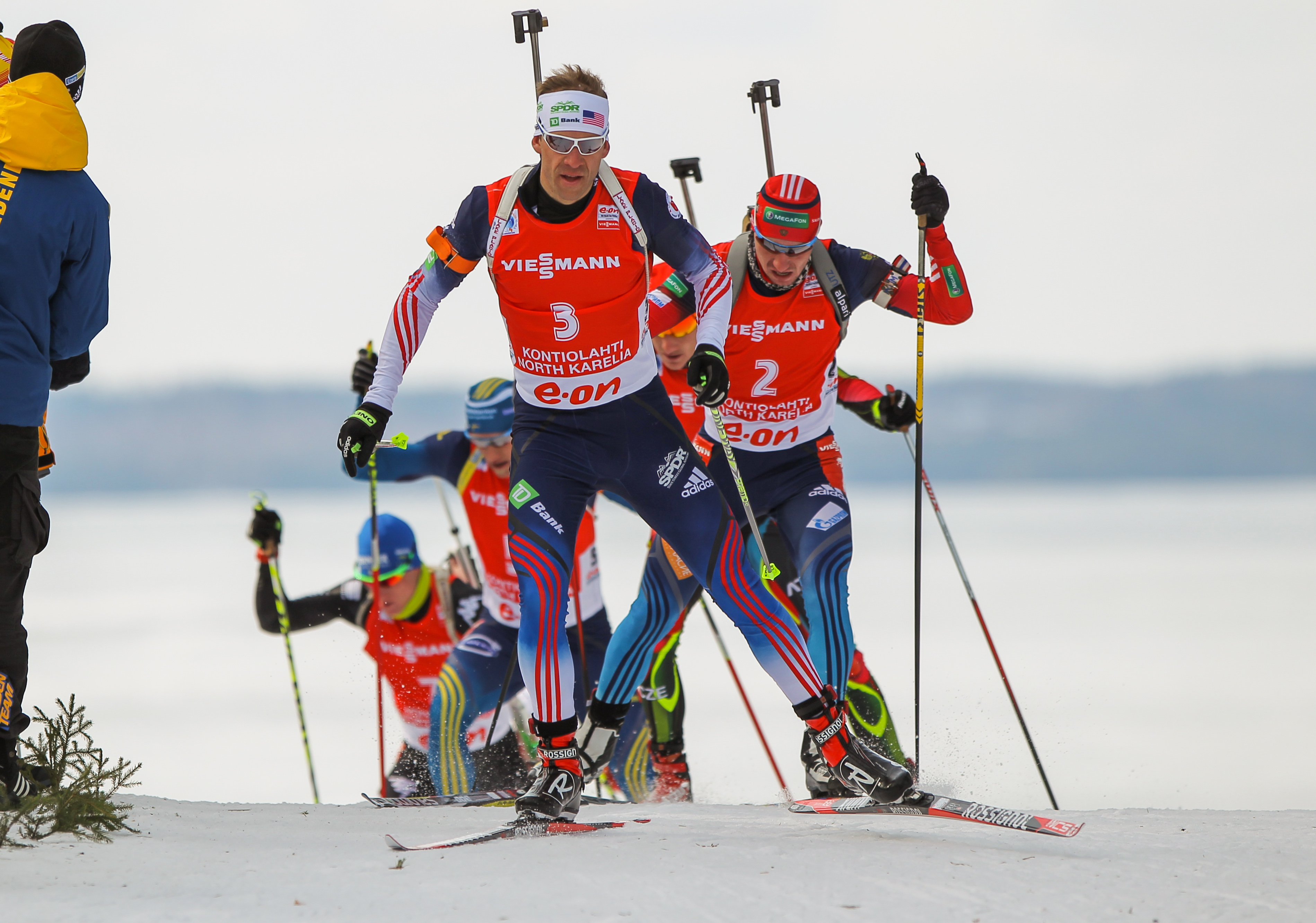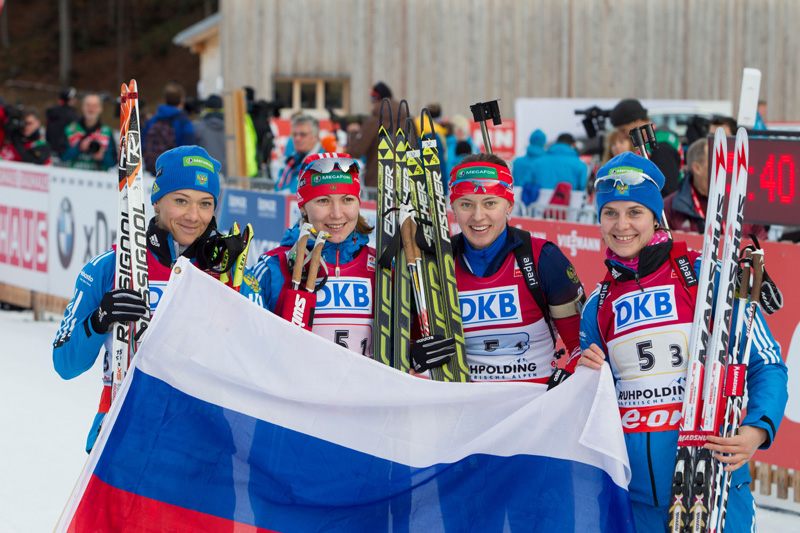
The Anti-Doping Hearing Panel for the International Biathlon Union (IBU) has finally handed down their decisions in the cases of three Russian athletes who were caught using EPO, a blood-doping drug. In each case, the samples were from late in 2013 and seemed abnormal at the time, but were not detectable as violations.
One year later, a new testing method became available, and the IBU re-tested the samples. Using the more sophisticated method, positive tests were found. The three athletes are Irina Starykh, Ekaterina Iourieva, and Alexander Loginov. Another athlete, Sergiu Sednev of Ukraine, also had a positive re-test, but did not fight the ruling and his case was concluded in April.
“The Russian Biathlon Union is not going to challenge [this decision],” Alexander Kravtsov, President of the Russian Biathlon Union, said in a press release. “The Russian Biathlon Union is working closely with RUSADA and WADA in the fight against the use of illicit drugs, and intends to continue to actively fight against doping in biathlon at all levels.”
At issue in the cases, besides the usual claims that EPO entered the athlete’s system by accident or as part of a remedy for some previously undisclosed illness, the hearing panel had to consider that the sample collection and the test were performed more than a year apart. That brought into question when to begin the bans: should it be from the time the sample was taken, or when the re-test was found positive?
Each of the three cases also had some of their own special considerations, for example if positive samples collected ten days apart constituted a single offense (one injection of EPO detected in both tests) or multiple offenses.

Loginov: Alexander Loginov, a former double gold medalist at World Junior Championships who also had three individual World Cup podiums to his name, generated the most buzz when the re-testing results came out. That was because he had never previously faced a doping infraction, unlike Starykh and Iourieva.
Loginov did not initially take advantage of the opportunity to submit a statement to the hearing panel, but the IBU gave him and extension and a second chance, for “fairness to the athlete”. At this point, Loginov responded that he had avoided commenting on the case because he was ashamed “to publicly disclose my intimate and personal problem, but 2 years ago, I was diagnosed with acute prostatitis,” a bacterial infection of the prostate gland.
Loginov claimed in the written statement that he wanted to be healthy for the Olympics. So on the recommendation of a friend he took a supplement which could supposedly help with the problem. He says that it contained “biologically active substances” and that, oops, EPO must have been one of them.
The hearing panel was unimpressed: they noted that Loginov did not bother to submit documentation showing that he actually had prostatitis, and also that EPO must be injected so the claim that it was in pill form in this supplement did not make sense.

Another interesting facet of the case is that the IBU counseled the panel to be lenient with the ban.
This took the form of urging the panel to consider carefully when to start the ban. Banning Loginov from competition starting on November 26, 2013, when the sample was first collected, would mean that he would almost have completed his two-year ban at this point.
The IBU advised against this, noting that usually even in cases of delay at least half the ban must be served out-of-competition. Loginov competed through the end of the 2014 season, finishing with a World Cup podium in Oslo, and was set to represent Russia in the first World Cups of 2014-2015 when his test result was released just before the competitions began.
However, starting a ban from November 2014, when the re-test was performed, would lead to a year of disqualified results plus two years out of competition. The IBU questioned whether this was fair to the athlete, to essentially serve a three-year ban instead of a two-year ban, and questioned whether some middle ground could be found.
Legally, there is one avenue for changing the date of the beginning of a ban to something other than the date of the test. It is a safeguard in case the federation itself intentionally drags out proceedings to try to further harm the athlete. The key condition here is that the extended length of time between the sample collection and testing is “not attributable to the athlete”. The IBU believed that this criteria had been fulfilled.
The panel disagreed, saying that in fact, the delay was entirely attributable to Loginov, who had implemented his doping in such a way that intentionally made it impossible to detect with currently available methods. Such behavior should not be rewarded, they wrote. In cases where the re-test happened even further after the date of sample collection, starting the ban from sample collection could even result in no actual time away from competition for an athlete, thus incentivizing this behavior.
As for starting the ban somewhere in between the two dates, as the IBU seemed to be requesting, the panel noted that this would have to be arbitrary on a case-by-case basis considering that the intervening time is likely to be different in each case. This would be both unfair, difficult to determine, and legally inadvisable, they concluded.
In the end, Loginov was banned for two years from the date of his re-test, and his results from the time between sample collection and testing were disqualified. The entire text of the decision, including these interesting deliberations, is available here.
The decision has ramifications for several athletes, among them Lowell Bailey of the United States, who finished one spot behind Loginov on the podium in Kontiolahti in 2014. Bailey should see the results amended and, hopefully, an increase in prize money.

Starykh: Irina Starykh had World Cup podiums in December 2013, and was looking set to lead the Russian team at the Sochi Olympics. Then, a sample collected in late December tested positive for EPO.
At the time she claimed that the EPO must have come from some cosmetic injections she took because she was self-conscious about her appearance. There was no evidence of this being the case: neither that she had actually taken injections, nor that EPO was present in the drug, LAENNEC. Starykh received a two-year ban.
The sample which re-tested positive was taken about ten days later, on January 2, 2014.
Before the second anti-doping hearing panel, Starykh did not claim innocence. At issue, instead, was whether the tests should be considered as separate or as one violation, since they occurred only days apart. Starykh argued that both tests could be the result of a single injection (she wrote an injection of the cosmetic enhancer, but the panel could consider it an injection of EPO), and thus that no additional ban should be implemented.
The IBU disagreed, arguing that not only should an additional ban be put in place, but it should be a longer one because the tests indicated multiple infractions.
The hearing panel concluded that because the tests were so close together in time, they must consider their process as if they were adjudicating both together. But they did decide that the two samples indicated that Starykh had used EPO multiple times – this is especially true since doping athletes now frequently use very small doses to try to avoid detection, but administer these doses repeatedly. The half-life of EPO is short, on the time scale of hours to days, so it seems impossible that the second test would still be indicating a single injection detected by the first test.
Thus, the panel decided to ban Starykh for one additional year, after her first two-year term is served. She will be eligible to compete again at the end of December, 2016.
Iourieva: Ekaterina Iourieva, a former World Champion, had already had two anti-doping infractions. She served a two-year ban beginning in 2009 after testing positive for EPO then. In the run-up to the 2014 Olympics she had returned to competition, although not very successfully. In December 2013 and January 2014 samples were collected in out-of-competition tests and were found to have EPO in them. The anti-doping hearing panel convened at the time banned Iourieva for eight years, noting that it was her second EPO violation in the space of eight years.
The re-tested samples were from November 2013, just a month before the samples that would earn her the eight-year ban. In the re-testing case, Iourieva did not respond to requests by the panel to present her side of the story. The panel even wrote the Russian Biathlon Union to offer her more time to respond, at which point the RBU wrote that “There will be no feedback from Iourieva as she decided to finish her professional sports career.”
The hearing panel concluded by disqualifying all of Iourieva’s results beginning in November 2013, and serving her a four-year ban – beginning in December 2021, when her eight-year ban ends.
Chelsea Little
Chelsea Little is FasterSkier's Editor-At-Large. A former racer at Ford Sayre, Dartmouth College and the Craftsbury Green Racing Project, she is a PhD candidate in aquatic ecology in the @Altermatt_lab at Eawag, the Swiss Federal Institute of Aquatic Science and Technology in Zurich, Switzerland. You can follow her on twitter @ChelskiLittle.



